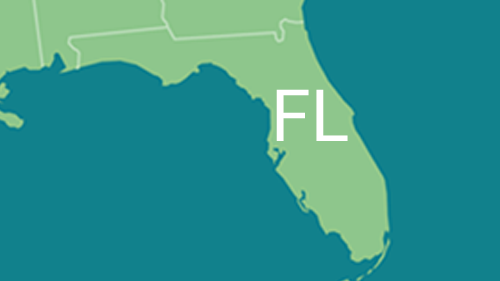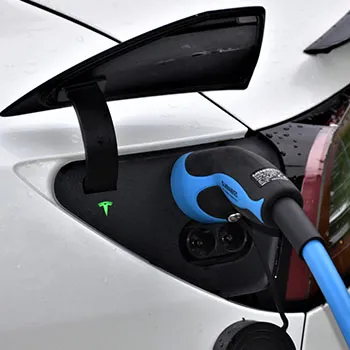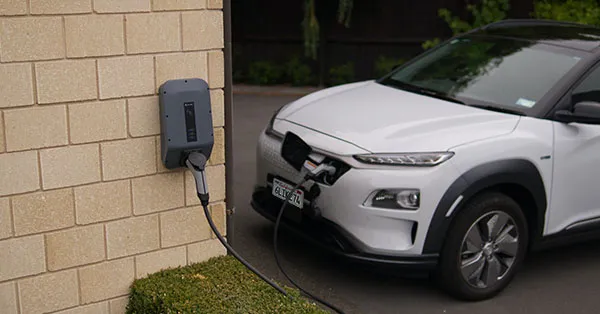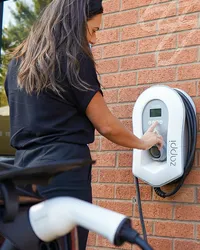
Rebates for Residential EV Chargers in Florida
Last updated: November 04, 2025
If you own, or are thinking of purchasing, an electric car, something that you had to consider at one point was how you were going to charge it. While Florida ranks #3 in the US for the number of publicly available EV Chargers, the convenience of being able to charge your electric car at home is hard to beat. These chargers can cost quite a bit though.
Typically, rebates for EV chargers can come multiple sources; your local town, county, electric utility, State or the Federal Government. In Florida, there are 8 programs that you may be able to use to get a rebate or incentive for installing an EV charger in your home. You can view the programs below.



Utility Rebate Programs
7 different utilities in Florida offer a rebate for residential EV chargers. To get these rebates, you must have an account with the utility providing the rebate.
Kissimmee Utility Authority - FL
Kissimmee Utility Authority - FL has a program called "KUA Home Charger Rebate" that offers rebates for EV Chargers installed in residences.The KUA Home Charger Rebate program offers a rebate of $200 per charger. The incentive may cover up to 100% of the material cost. The rebate program covers Level 2 EV chargers.
The charger must be on the program's approved list. Included chargers are EvoCharge.
Go to Kissimmee Utility Authority - FL Website
Florida Power and Light
Florida Power and Light has a rebate program that covers residential EV chargers. The program is called "FPL EVolution Home Program."The incentive may cover up to 100% of the project cost. The rebate program covers Level 2 EV chargers. Charging station must be networked.
Go to Florida Power and Light Website
Jacksonville Electric Authority - FL
Jacksonville Electric Authority - FL offers rebates for residential EV chargers through a program called "JEA Drive Electric Residential Program."The JEA Drive Electric Residential Program program offers a rebate of $300 per site. The incentive may cover up to 15% of the make-ready cost. The rebate program covers Level 2 EV chargers.
Go to Jacksonville Electric Authority - FL Website
New Smyrna Beach FL Utilities
New Smyrna Beach FL Utilities has a program called "New Smyrna Beach EV Chargers" that offers rebates for EV Chargers installed in residences. The program is currently open with an expected end date of September 30th 2026. However, keep in mind; the program may close sooner if its budget is depleted before the deadline.The New Smyrna Beach EV Chargers program offers a rebate of $100 per charger. The incentive may cover up to 100% of the material cost. The rebate program covers Level 2 EV chargers.
Go to New Smyrna Beach FL Utilities Website
Keys Energy Services - FL
Keys Energy Services - FL offers rebates for residential EV chargers through a program called "Keys Energy Services - EV Chargers."The Keys Energy Services - EV Chargers program offers a rebate of $350 - 400 per charger. The incentive may cover up to 100% of the project cost. The rebate program covers Level 2 EV chargers.
Go to Keys Energy Services - FL Website
Duke Energy FL
Duke Energy FL has a program called "Duke Energy FL -Homebuilder Charger Prep Credit" that offers rebates for EV Chargers installed in residences.The Duke Energy FL -Homebuilder Charger Prep Credit program offers a rebate of $150 per site. The incentive may cover up to 100% of the make-ready cost. The rebate program covers Level 2 EV chargers.
Duke Energy FL
Duke Energy FL offers rebates for residential EV chargers through a program called "Duke Energy FL - EV Charger Prep Credit."The Duke Energy FL - EV Charger Prep Credit program offers a rebate of $819 per charger. The incentive may cover up to 100% of the make-ready cost. The rebate program covers Level 2 EV chargers.


Federal Tax Incentive
The Federal Goverment has a tax credit for installing residential EV chargers. Commonly referred to as the 30C Federal Tax Credit, this incentive offers 30% of the cost of installing an EV Chargers up to $1,000.When the tax credit was renewed in 2022, a new stipulation was added that in order to receive the tax credit, the property must be located in an approved census tract. This requirement applies to any installations completed after December 31, 2022.
Learn more about the Federal Tax Credit
What is the difference between the types of EV chargers?
A Level 1 EV Charger plugs into a standard out in your home (120V) to juice up your car. Usually, a level one charger can add 2 to 3 miles to your car for each hour they're used. Most electric vehicles in the US will come with a Level 1 charger.
A Level 2 EV charger lets you charge up your electric vehicle much around five times faster. These chargers use 240V or the type of outlet you see for an electric dryer or stovetop. They add between 12 and 60 miles to your battery each hour.
A Level 3 EV charger is the fastest type of EV charger. They're also called fast chargers, DCFC chargers, and DC fast chargers. These units typically use 400V or more and add 150 miles to a battery in an hour. They're not very common in residential applications at this point.
Learn more about the types of EV Chargers
How much does an EV charger cost?
The cost of an EV charger can vary depending on the specific type you want to purchase. They usually range from $300 - 1,000. It's important to remember that Level 2 and Level 3 chargers typically require professional installation, which often costs more than the charger itself. You can see examples of chargers below:
Do businesses qualify for this EV charger rebate?
Businesses, non-profits, and multi-family facilities are considered commercial accounts by many utilities. Commercial accounts have different rebate programs to use than residential accounts. Rebates4EVChargers only shows residential rebates.
Additional information
Understanding the differences between EV charger types
Not every EV charger is the same. Learn about the differences between the EV charger types and how it can impact how quickly a car recharges.
Continue reading
Next Generation of EV Chargers Shown Off at CES
At this year's Consumer Electronics Show (CES), we saw some exciting new models of home EV chargers with new features and faster charging ability.
Continue reading
Disclaimer: The information above is provided as an informational resource. Rebates4EVChargers does not provide any warranties or representations as to, and will not be responsible for, the accuracy or correctness of the rebate information. Contact your rebate provider for the most current information. As an Amazon Associate, Rebates4EVChargers may earn commissions from qualifying purchases.